- Home
- Gavin Chappell
The Hadrian Legacy Page 3
The Hadrian Legacy Read online
Page 3
‘O, the times, O, the customs,’ commented the fat little man acerbically. ‘And this is what will be giving you the leg-up? You’ve been appointed as his replacement?’
‘Very good, Marcius Magnus,’ said Corvus. ‘It’s almost as if you had read the message beforehand.’
‘The message was sealed in Rome,’ Flaminius snapped.
Corvus laughed. ‘Only my little joke,’ he reassured the tribune. ‘It comes as no surprise that I should be called upon. I am highly skilled and experienced in such a role, although work has been sadly scarce recently.’
The tall Gaulish woman laughed. ‘Everyone knows you would be called for if a vacancy came up, Corvus.’
‘We are instructed to accompany you to the province, sir,’ Flaminius said. ‘When will you be leaving?’
‘I’m sure there’s no hurry,’ said Corvus. ‘What’s yer name?’ Flaminius introduced himself and his centurion. ‘There’s no hurry, tribune,’ Corvus repeated. ‘But are we to be accompanied by two messengers? Do you have messages to deliver in Britain, too? My, the emperor keeps you busy.’
Flaminius resented the idea. ‘We’re with the Commissary.’
This was greeted by a silence, broken at last by an impatient caw from Lugus. Flaminius had not really been hoping to impress them; he doubted civilians would appreciate how much power the Commissary wielded as imperial agents, but put out by Corvus’ attitude he felt the need to assert himself.
‘So,’ purred the Gaulish woman, her bold gaze flickering up and down Flaminius’ armoured form. ‘We’re to be fellow travellers, are we?’
‘How delightful.’ Corvus’ demeanour had changed entirely. ‘Please, take a seat. Food must be served.’ He called for the major domo. ‘And make up two spare rooms for our guests. If we are to be travelling together, we must get to know each other. No, no, I won’t hear of you staying in a draughty waystation when you have my villa at your disposal.’
His sudden hospitality was overwhelming.
During the following meal, Flaminius tried to gauge his host, and the two with him; Marcius Magnus, who was Corvus’ amanuensis, and the mysterious Gaulish woman, Epasias. They all seemed to be trying too hard, to his mind, but he had met provincial gentry before. In the last year or two he’d become accustomed to the manners of the City.
Junius Italicus was silent through the meal, overawed. ‘With respect, sir,’ he said, as they retired for the night. ‘With respect, you shouldn’t have said we belonged to the Commissary.’
Flaminius shrugged. ‘The new procurator should know who we really are. I also intend to announce myself to the governor, Platorius Nepos.’
‘Tread carefully, sir,’ Junius Italicus warned him. ‘Don’t trust anyone, that’s my advice.’
Flaminius was tired. ‘I never do,’ he said firmly, and closed his bedchamber door behind him.
He had learned to distrust people in his line of work, it was true. He had known unexpected betrayals in the past. Lying on the soft bed beneath silken sheets, he tried to get to sleep, but it evaded him for many hours.
The following morning, Corvus had had a change of heart. The new procurator spent much of the day putting his effects into order and preparing for the journey, which would take the best part of a month. He left his new guests in the care of his friends, and just before noon Flaminius found himself walking in the gardens with Epasias and her maid, a silent, elderly Gaulish woman.
‘How long have you known the procurator?’ the tribune asked her, trying to find common ground for conversation.
‘Since childhood,’ she replied, exuding a most discreet scent of oil of myrtle. Telinine unguent, if Flaminius was any judge. ‘I was his sweetheart. Of course, he had to marry a Roman woman for the sake of his career, but his heart was always mine.’ Corvus’ wife had died of fever after she had served her purpose and borne her husband a son, Epasias went on to explain, who was now serving as tribune in Judaea. Flaminius realised that she and Corvus were lovers.
He disapproved, not on moral grounds, but political. Carrying out such liaisons so publically and shamelessly could put the procurator in an awkward situation; it made him open to manipulation, but it wasn’t Flaminius’ place to say so. Instead he found himself saying, ‘That was convenient.’
Epasias gave him a frosty look, and her Gaulish accent became more pronounced. ‘I beg your pardon?’
‘Sorry,’ he said, mentally kicking himself.
They halted at the edge of the lawn, where a half-ruined temple stood. Beyond it the meadows and woods of the estate rolled towards the horizon. Only the smokes of Lugdunum on the skyline troubled the tranquil scene.
Flaminius had been too long in this line of work. Not everyone spent all their time poisoning people or up to their necks in intrigue—these were good, respectable people, if a little eccentric in their ways.
On returning to the villa with Epasias he got a better idea of how eccentric. The Gaulish woman’s attitude towards him had thawed a little as she led him through the herb garden and she pointed out the various plants that grew there and told him their uses, picking several with her long nailed fingers. In the middle was a large columbarium whose occupants filled the air with their gentle coos.
They returned through the kitchens, Epasias pausing to hand over herbs to the slaves preparing dinner and to chivvy them on to fresh effort. In the atrium, Corvus stood with Marcius Magnus before the statue of Mercury. Junius Italicus skulked nearby, looking uncomfortable. As Epasias turned, Corvus swung around eagerly.
‘There you are, my dear!’ For a moment, Flaminius thought the procurator was talking to him. Then Corvus caught his eye. ‘And our martial guest! I have decided that the most important part of our preparations, ere we embark for Albion’s white cliffs, is to sacrifice to Mercury for a good journey.’
‘Albion?’ Flaminius said. ‘I thought we were going to Britain.’
Corvus gave him a kindly smile. ‘I was being poetic,’ he explained, and summoned a slave to provide them all with drinks. ‘Albion is an old name for the isle of the Painted People.’
‘I see. What sort of sacrifice were you thinking of?’ Flaminius envisaged a libation or two, or an offering of fruit at a wayside altar.
Corvus put his hands behind his back and strutted up and down, his face creased with thought. ‘We shall make the offering in the old temple. It shall be to Mercury, god of travellers but also god of financial gain, and Rosmerta, his beneficent consort.’
Flaminius shared a puzzled look with Junius Italicus. He’d never heard of any Rosmerta. As far as he recalled, Mercury’s wife was called Larunda.
‘After all,’ Corvus added, ‘I hope that at journey’s end, we will find our time in Britain profitable.’
Accepting a glass of wine from the slave, Flaminius put it to his lips, glad of some way to conceal his expression. Everyone knew that public officials often used their postings to feather their own nests, but it was bad taste to speak about it so openly—particularly on being appointed procurator of a province.
They spent the rest of the day in preparations under Corvus’ peevish direction. Late that afternoon, a solemn procession departed the main building of the villa. Corvus led it, clad in his equestrian toga, with Lugus perched on his shoulder, producing occasional caws as they crossed the lawn. Epasias swept along behind him, wearing a stola of red linen, gazing around her with an oddly belligerent air, while Marcius Magnus waddled beside her, almost tripping over the folds of a toga too big for him. Flaminius and Junius Italicus brought up the rear.
‘What are we sacrificing, sir?’ Junius Italicus whispered in Flaminius’ ear.
Flaminius grinned. ‘I don’t know, but the way they drink in this place I should think we’ll be making a few more libations.’
Corvus could certainly put it away, even when preparing for a month’s journey. He never seemed to get drunk, either. Flaminius had done his duty as a guest, accepting several sacksful of wine, it seemed, and he was not stric
tly sober. He’d not had so much to drink since leaving Baiae.
‘I will say this, sir,’ Junius Italicus replied, ‘if it turns into an orgy, I for one will leave this place and walk all the way to Britain.’
They walked up the steps of the ivy clad temple Once, when Flaminius had been a boy and the family was visiting cousins in Rome, they had attended a religious festival at the temple of Jupiter Optimus Maximus. He remembered how the hecatomb of oxen had been led up the steps, hung with garlands of flowers, their heads held high and proud, and how upset he had been to learn their fate. It hadn’t stopped him from enjoying eating some of the cooked flesh that was shared out among the spectators, but it had seemed unfair to him that the oxen should step so proud up the steps unaware that they were strolling into the slaughterhouse.
They halted in front of the images of Mercury—shown per Roman convention as a man in a winged helmet carrying a caduceus—and Rosmerta, a Gaulish woman carrying a horn of plenty. One thing puzzled Flaminius. Corvus had spoken of making a sacrifice, but no cattle, no sheep, had been brought with them. Not so much as a dove. But hanging from Corvus’ girdle was a long, wicked looking knife.
The procurator placed the knife on the altar after Epasias took the raven from him and bound its legs, wings, and beak.
‘O Mercury Cissonius, and ye, his consort the bountiful Rosmerta, we will soon embark on a long journey. Grant it be successful and peaceful, let us not be robbed or murdered by enemies, and let us profit from our efforts. In return, I consecrate to you this sacrifice.’
Corvus took the pet raven from Epasias’ hands and placed it on the altar, put his hands around his pet’s neck and wrung it like a scullion wringing the neck of a chicken. He dropped the carcase on the altar and then used the knife to cut open a vein from which blood dripped onto the marble surface. Junius Italicus watched with a disgusted expression. Marcius Magnus was licking his lips as if they were dry, and wiping the palms of his hands on his toga as he watched with unholy glee.
It was a bit much, to Flaminius’ mind. Animal sacrifice was one thing, if you could afford it. And he had watched the bloody slaughter in the beast shows in the arena avidly until the time he’d found himself on the receiving end (all in the line of duty), after which they seemed rather less fun. But killing a creature you’d tamed and fed and made a pet of?
The ceremony complete, they returned to the villa for dinner. Corvus came alongside Flaminius.
‘You seem shocked,’ the man said. ‘Lugus was dear to me, of course. I raised him from the egg. But the gods know the hearts of men, and for a sacrifice to work, it must be sincere. It must truly be a sacrifice.’
Epasias laughed condescendingly. Corvus swept on. Flaminius shared another look with Junius Italicus.
As far as Flaminius was concerned, if the gods even existed, they dwelt on a far higher plane than this world. Epicurus said they lived in eternal bliss, far from the miseries of men, and paid not the slightest attention to the thoughts in his heart. Corvus’ religion seemed to belong to a less sophisticated age. Some Romans would love it, traditionalists like his father, but Flaminius found it just a little disturbing. He looked forward to bidding these strange civilians farewell and returning to the more wholesome world of intrigue that constituted his livelihood.
‘You didn’t seem to enjoy the sacrifice earlier,’ Epasias remarked, chewing on a wing of Numidian chicken during the evening meal. Her couch was near Flaminius,’ and she seemed determined to strike up a conversation.
‘I was surprised, that’s all,’ he told her. ‘I thought the procurator doted on the bird! I had a pet mouse when I was a small boy. The farmyard cat caught it, and I was very upset.’
‘You’re too soft hearted for a military man,’ Epasias said with a laugh. ‘But you seem confused about the nature of sacrifice. Unsurprising, coming from Rome as you do. There, I understand, people do little more than pay lip service to the gods. Here in Gaul we are more devout.’
‘People used to believe that a man’s life could be bought by the sacrifice of another’s,’ Corvus observed, picking at a dish of salmon cooked in cumin. ‘If someone was ill, or risked his life in combat, he would offer up another man in his place, and the gods contented themselves with the sacrifice.’
‘Of course, no one believes that these days.’ Flaminius laughed. ‘All that ended years ago—in Gaul, at least.’
‘Who knows what lurks in people’s minds, sir,’ Junius Italicus said, speaking for the first time. ‘When I was in the Dacian Wars, the Gaulish auxiliaries took up headhunting again, like their forefathers in Caesar’s day. Some of the legionaries took it up, too. My old mate Claudius Maximus took King Decebalus’ head…We exterminated the Dacians in the end, of course. Strange days. Though I saw stranger things in Mesopotamia.’ Absently he rubbed at the scar in his forehead.
Corvus leaned across to Flaminius, and asked in an undertone: ‘Are you a Persian, tribune?’
Flaminius stared at him. What his host talking about now? ‘No, procurator,’ he said. ‘I’m a Roman citizen.’
Corvus’ eyes dimmed with disappointment. He turned to Junius Italicus. ‘You, centurion—you’re a Persian?’
Junius Italicus stiffened on his couch. His eyes darted as if he thought this the wrong venue for such a conversation. ‘I’m a Lion, sir.’
The others were embarrassed by the enigmatic interchange. Not dinner party conversation at all, Flaminius thought; whatever it was they were talking about. He felt excluded. Very rude. Time to change the subject. But the conversation grew darker. At last he made his excuses and went to his bed.
The next day at dawn the journey began. The slaves must have been busy all night packing the carts and carriages with the new procurator’s impedimenta, little of which had anything to do with his official position. Flaminius was amused to see that the pigeons from the columbarium had been brought along in cages. Their coos filled the air as the journey progressed.
—5—
Forest of the Carnutes, 27 April
Two weeks later they were riding through a forest. Following this road—Corvus said it would be quieter than the main road from Lugdunum—would take them ultimately to Gesoriacum, where they would make the crossing to Britain.
It was blowing a gale and there seemed to be a dismal feeling in the air. Epasias sat in the carriage with Corvus while the others rode on horseback. She was talking teasingly to Flaminius, who rode nearby, feeling increasingly uncomfortable. To his relief, the conversation faltered when a slave at the front came galloping back.
‘Men on horseback among the trees, master,’ he announced.
Corvus thrust his head out and glared at the man. ‘What’s so strange about that?’ he asked. The air hummed. ‘Don’t trouble me with trifling...’ He broke off as the slave flung up his hands.
Flaminius’ hair stood on end. As the slave fell from his horse he saw that it an arrow protruded from his face. The slave had been shot.
‘Bagaudae!’ Epasias shrieked from within the carriage.
‘Bagaudae?’ Flaminius repeated the unfamiliar word.
‘Robbers,’ Junius Italicus translated it. ‘We’d better investigate.’ He loosened the sword in his sheath, although he would have to dismount before he could use it effectively. Flaminius rested his hand on the pommel of his cavalry longsword and trotted forward.
The wind moaned through the trees.
Corvus started getting down from his carriage. ‘Tribune!’ he called, hand raised, looking down at the arrow pierced slave at his feet.
This was all they needed; a civilian thinking he could save the day. ‘Get back in the carriage, sir,’ he told the procurator. ‘We’ll deal with this problem. It’s our job.’
Flaminius gathered some of the more stalwart slaves and servants accompanying them, and gestured them to follow. They fanned out across the muddy track. Flaminius reached a turn where he could see deep into the forest.
The slave had been right. Visible in the green
gloom, no more than two hundred yards from the edge of the track, armed men sat on pony back. They didn’t look like military men. The chances were high that they were robbers—bagaudae seemed to be the Gaulish word. But linguistics was not Flaminius’ chief preoccupation right now.
‘There!’ Junius Italicus pointed in the other direction. More dark mounted figures were waiting in the trees on the far side.
‘On both sides of the track,’ Flaminius commented. ‘If we continue, they’ll ride down on us.’
‘Why are they just waiting there?’ Junius Italicus said in frustration. ‘Why don’t they attack now? We could deal with them, you and me.’ He indicated the slaves at their back. ‘Even these lads can help.’
Flaminius was uneasy. ‘Don’t make any sudden moves. They’re just trying to intimidate us.’
‘Intimidate us!’ Junius Italicus snorted. ‘Them?’
‘Aren’t you going to do anything, master?’ asked one of the slaves, a Hispanian with dark, greasy hair and sallow skin.
‘If necessary,’ said Flaminius. He raised his voice. ‘No need for it to come to a fight if they’ll just go on their way quietly. They don’t want to meddle with two Praetorians.’
The slaves gazed at him and his companion. ‘You’re Praetorians, master?’ someone asked in awe.
Flaminius glanced at Junius Italicus. ‘Well, ex-Praetorians,’ honesty demanded he say.
Still the men stayed under the trees. They outnumbered Flaminius and his companions, and they were better armed than the slaves.
‘It’s as if they’re waiting for something,’ Junius Italicus remarked.
A shriek rang through the forest.
—6—
It came from back down the track, the direction of Corvus and the carriage. But it wasn’t Corvus shrieking. It sounded like a woman.
‘Epasias,’ he surmised.

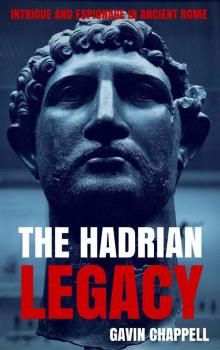 The Hadrian Legacy
The Hadrian Legacy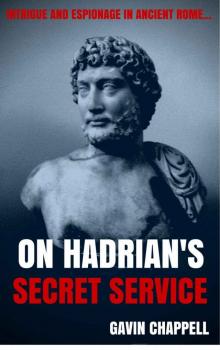 On Hadrian's Secret Service
On Hadrian's Secret Service Murder in Hadrian's Villa
Murder in Hadrian's Villa The Sword of Wayland
The Sword of Wayland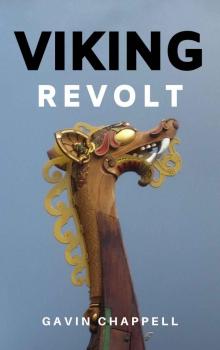 Viking Revolt
Viking Revolt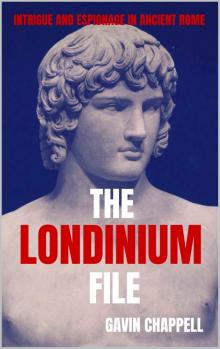 The Londinium File
The Londinium File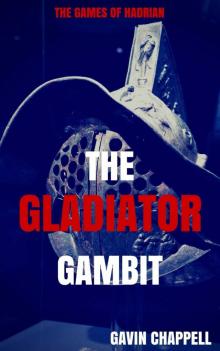 The Gladiator Gambit
The Gladiator Gambit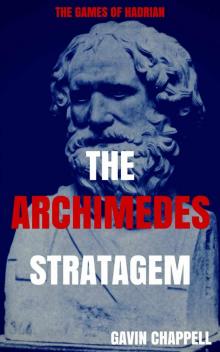 The Archimedes Stratagem
The Archimedes Stratagem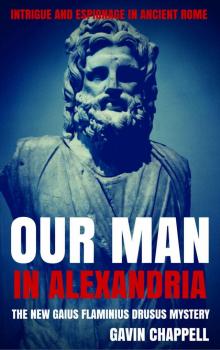 Our Man in Alexandria
Our Man in Alexandria Into the Void (The Dungeoneers)
Into the Void (The Dungeoneers)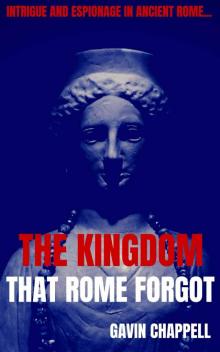 The Kingdom That Rome Forgot
The Kingdom That Rome Forgot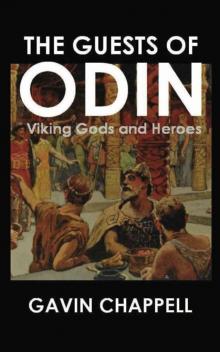 The Guests of Odin
The Guests of Odin